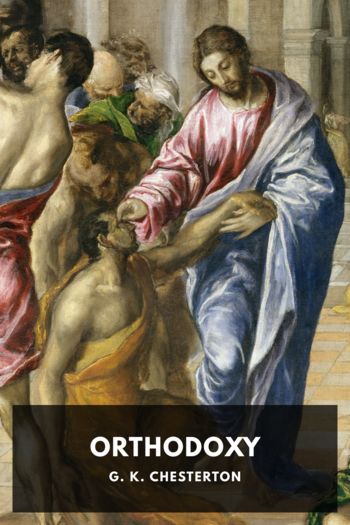Orthodoxy, G. K. Chesterton [best way to read e books txt] 📗

- Author: G. K. Chesterton
Book online «Orthodoxy, G. K. Chesterton [best way to read e books txt] 📗». Author G. K. Chesterton
Here again we reach the same substantial conclusion. In so far as we desire the definite reconstructions and the dangerous revolutions which have distinguished European civilisation, we shall not discourage the thought of possible ruin; we shall rather encourage it. If we want, like the Eastern saints, merely to contemplate how right things are, of course we shall only say that they must go right. But if we particularly want to make them go right, we must insist that they may go wrong.
Lastly, this truth is yet again true in the case of the common modern attempts to diminish or to explain away the divinity of Christ. The thing may be true or not; that I shall deal with before I end. But if the divinity is true it is certainly terribly revolutionary. That a good man may have his back to the wall is no more than we knew already; but that God could have his back to the wall is a boast for all insurgents forever. Christianity is the only religion on earth that has felt that omnipotence made God incomplete. Christianity alone has felt that God, to be wholly God, must have been a rebel as well as a king. Alone of all creeds, Christianity has added courage to the virtues of the Creator. For the only courage worth calling courage must necessarily mean that the soul passes a breaking point—and does not break. In this indeed I approach a matter more dark and awful than it is easy to discuss; and I apologise in advance if any of my phrases fall wrong or seem irreverent touching a matter which the greatest saints and thinkers have justly feared to approach. But in that terrific tale of the Passion there is a distinct emotional suggestion that the author of all things (in some unthinkable way) went not only through agony, but through doubt. It is written, “Thou shalt not tempt the Lord thy God.” No; but the Lord thy God may tempt Himself; and it seems as if this was what happened in Gethsemane. In a garden Satan tempted man: and in a garden God tempted God. He passed in some superhuman manner through our human horror of pessimism. When the world shook and the sun was wiped out of heaven, it was not at the crucifixion, but at the cry from the cross: the cry which confessed that God was forsaken of God. And now let the revolutionists choose a creed from all the creeds and a god from all the gods of the world, carefully weighing all the gods of inevitable recurrence and of unalterable power. They will not find another god who has himself been in revolt. Nay, (the matter grows too difficult for human speech) but let the atheists themselves choose a god. They will find only one divinity who ever uttered their isolation; only one religion in which God seemed for an instant to be an atheist.
These can be called the essentials of the old orthodoxy, of which the chief merit is that it is the natural fountain of revolution and reform; and of which the chief defect is that it is obviously only an abstract assertion. Its main advantage is that it is the most adventurous and manly of all theologies. Its chief disadvantage is simply that it is a theology. It can always be urged against it that it is in its nature arbitrary and in the air. But it is not so high in the air but that great archers spend their whole lives in shooting arrows at it—yes, and their last arrows; there are men who will ruin themselves and ruin their civilisation if they may ruin also this old fantastic tale. This is the last and most astounding fact about this faith; that its enemies will use any weapon against it, the swords that cut their own fingers, and the firebrands that burn their own homes. Men who begin to fight the Church for the sake of freedom and humanity end by flinging away freedom and humanity if only they may fight the Church. This is no exaggeration; I could fill a book with the instances of it. Mr. Blatchford set out, as an ordinary Bible-smasher, to prove that Adam was guiltless of sin against God; in manoeuvring so as to maintain this he admitted, as a mere side issue, that all the tyrants, from Nero to King Leopold, were guiltless of any sin against humanity. I know a man who has such a passion for proving that he will have no personal existence after death that he falls back on the position that he has no personal existence now. He invokes Buddhism and says that all souls fade into each other; in order to prove that he cannot go to heaven he proves that he cannot go to Hartlepool. I have known people who protested against religious education with arguments against any education, saying that the child’s mind must grow freely or that the old must not teach the young. I have known people who showed that there could be no divine judgment by showing that there can be no human judgment, even for practical purposes. They burned their own corn to set fire to the church; they smashed their own tools to smash it; any stick was good enough to beat it with, though it were the last stick of their own dismembered furniture. We do not admire, we hardly excuse, the fanatic who wrecks this world for love of the other. But what are we to say of the fanatic who wrecks this world out of hatred of the other? He sacrifices the very existence of humanity to the nonexistence of God. He offers his victims not to the altar, but merely to assert the idleness of the altar and the emptiness of the throne. He is ready to ruin even that primary ethic by which all things live, for his strange and eternal vengeance





Comments (0)